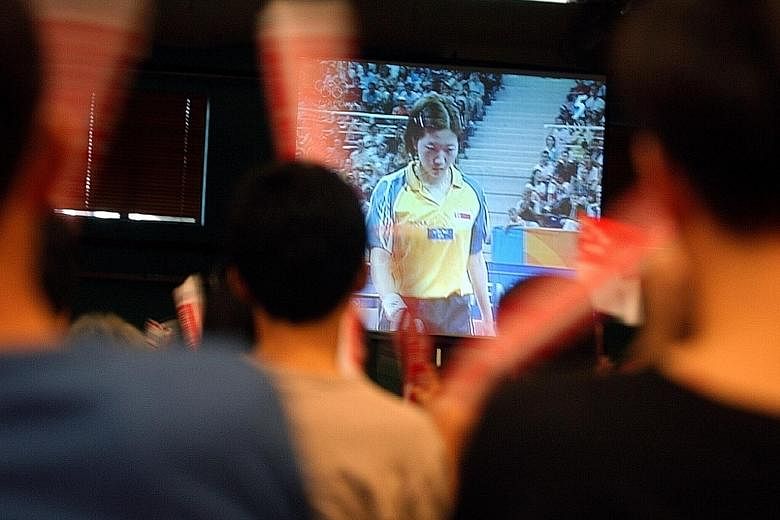For so long, the International Olympic Committee (IOC) lived in the shadow of Fifa when it came to the sale of broadcast rights.
The 2014 World Cup saw football's world governing body make US$2.4 billion (S$3.22 billion) from broadcast rights alone. In contrast, the 2012 Olympics bagged the IOC US$2.57 billion, considered modest for a multi-sport event.
But that changed when the IOC awarded the 2016 Olympics' broadcast rights for 22 Asian territories to Dentsu, a third-party media agency from Japan. The market talk is that it paid around two to three times what the IOC was expecting.
It was the same in Europe, where the broadcast rights of 40 countries were awarded to Sportfive.
The paradigm shift, awarding broadcast rights to cash-rich, profit-driven, third-party agencies over state broadcasters with a national interest, inevitably drove broadcast rights fees up. This is the situation Singapore finds itself in, with the asking price to beam the Rio Olympics live (approximately US$6 million) reportedly more than double that of the London Games.
That Dentsu holds the rights of the next two Winter and Summer Olympics here means the situation might not change any time soon.
One can argue this goes against the Olympic Movement, which lists ensuring "the regular celebration of the Olympic Games" as one of the IOC's roles.
Asked about this seeming contradiction, an IOC spokesman told The Straits Times: "The IOC's broadcast philosophy is to reach the widest possible audience around the world, whilst ensuring the best possible financial offer.
"Ninety per cent of the revenues generated by the IOC are distributed to the wider sporting movement, including to athletes and Olympic teams - therefore the revenues generated through the broadcast agreements the IOC reaches are important for sport at all levels around the world."
Media industry experts say that, rather than bemoaning the soaring prices, broadcasters and pay-TV operators should channel their energies towards marketing the Games' broadcast to generate interest.
Hass Aminian, who was involved in content production and promotion with Mediacorp, then StarHub when Singapore broadcast the 2000 Sydney Games and 2008 Beijing Games, said: "Maybe the ratings for London 2012 weren't good, so the asking price for Rio seemed too high to broadcasters. But ratings are not fixed to the product (but instead) reflect promotion and marketing efforts."
He explained that these days, "it's no longer just about showing sports events on your channels" and argued that broadcasters need to do more to promote their coverage of a global event.
One way they can do this is by building strong supporting content that taps on people's emotions, such as producing features profiling athletes on their gruelling Olympic trail, as well as timely advertising campaigns that create touchpoints with the public.
He pointed to how United States network NBC had positioned itself as the Olympic channel months before the Games by posting Olympic-related content regularly on a dedicated Facebook page as an example of a focused campaign.
Another example was how Singtel, a partner of the Singapore National Olympic Council, ran six television commercials featuring national athletes in the build-up to last year's SEA Games.
"By the time the Games start, people will be very interested," said Aminian, who now runs his own marketing businesses. "But all these take time and effort to produce. So whoever wants to broadcast the next Olympics (Pyeongchang 2018 and Tokyo 2020, both cities just one hour ahead of Singapore) needs to do a deal early and start planning now."
For now, Singapore broadcasters and the government, which had previously stepped in with extra funding for the 2006 Commonwealth Games broadcast, appear to be sticking to their guns, refusing to bow to Dentsu's asking price.
-
2-3x
-
It is believed that Dentsu paid about two to three times what the IOC was expecting for the rights to broadcast the 2016 Olympics to 22 Asian territories.
But the question remains: If Singapore holds firm, will broadcast rights fees for the 2020 Olympics go down? A look at NBC's US$7.75 billion deal to broadcast the Summer and Winter Games from 2022 to 2032 suggests otherwise.
After all, the rising popularity of video on demand and streaming services like Netflix means viewers can consume media whenever they want to - and often without commercials. This in turn makes live events more lucrative, as viewers have to watch in real time - while also taking in the commercials.
This is why a 30-second advertisement during Super Bowl, the championship game of the US' National Football League, costs US$5 million. Advertisers are willing to pay that sum to reach out to the reported 114 million who tune in.
Aravind Venugopal, vice-president at consulting and research provider Media Partners Asia, said there is no guarantee Singapore's tough stance will force prices down in four years' time.
He said: "Maybe to a certain extent. But the time difference is only one hour. More action will happen during prime time, meaning there will be more viewers.
"Furthermore, Singapore might send more athletes. Medal chances might improve. Sure, Dentsu will want to penetrate as many markets as possible but it has to look at profit margins."
One thing is for sure. If Singapore wants to avoid another Olympic blackout in 2020, it needs to act fast. Because the starting gun has sounded.

